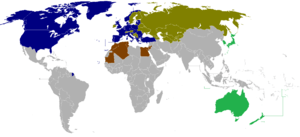Romania–NATO relations
Romania joined the North Atlantic Treaty Organisation (NATO) on March 29, 2004 following the decision taken at the Prague Summit, in November 2002. For Romania, this has represented a major evolution, with decisive influence on the foreign and domestic policy of the country. NATO membership represents the guarantee of security and external stability, which is vital for ensuring the prosperous development of the country. Romania is playing an active role in promoting the values and objectives of the Alliance, by both participating in the operations and missions of the Alliance and involving in its conceptual initiatives and evolutions.
Military relations and peacekeeping missions
Romania was a partner to the allied forces during the Gulf war, particularly during its service as president of the UN Security Council. Romania has been active in peacekeeping operations in UNAVEM in Angola, IFOR/SFOR in Bosnia, in Albania, in Afghanistan and has sent 860 troops in Iraq after the invasion led by the United States.
Romania enforced United Nations' sanctions against Yugoslavia. Despite divisions within the Parliament and among the people, Romania supported NATO in the Kosovo campaign and granted approval for NATO to overfly Romanian airspace. It was the first country to enroll in NATO's Partnership for Peace program, later joining NATO in 2004.
Romania also is a member of the Organization for Security and Cooperation in Europe (OSCE) and the North Atlantic Cooperation Council (NACC).
In August 2014, Romanian President Traian Basescu called on NATO countries to send arms to the Ukrainian army.[1]
References
- ↑ "NATO members should arm Ukraine - Romania". TVNZ. AP.
| ||||||||||||||||
| ||||||||||||||||||||||||

